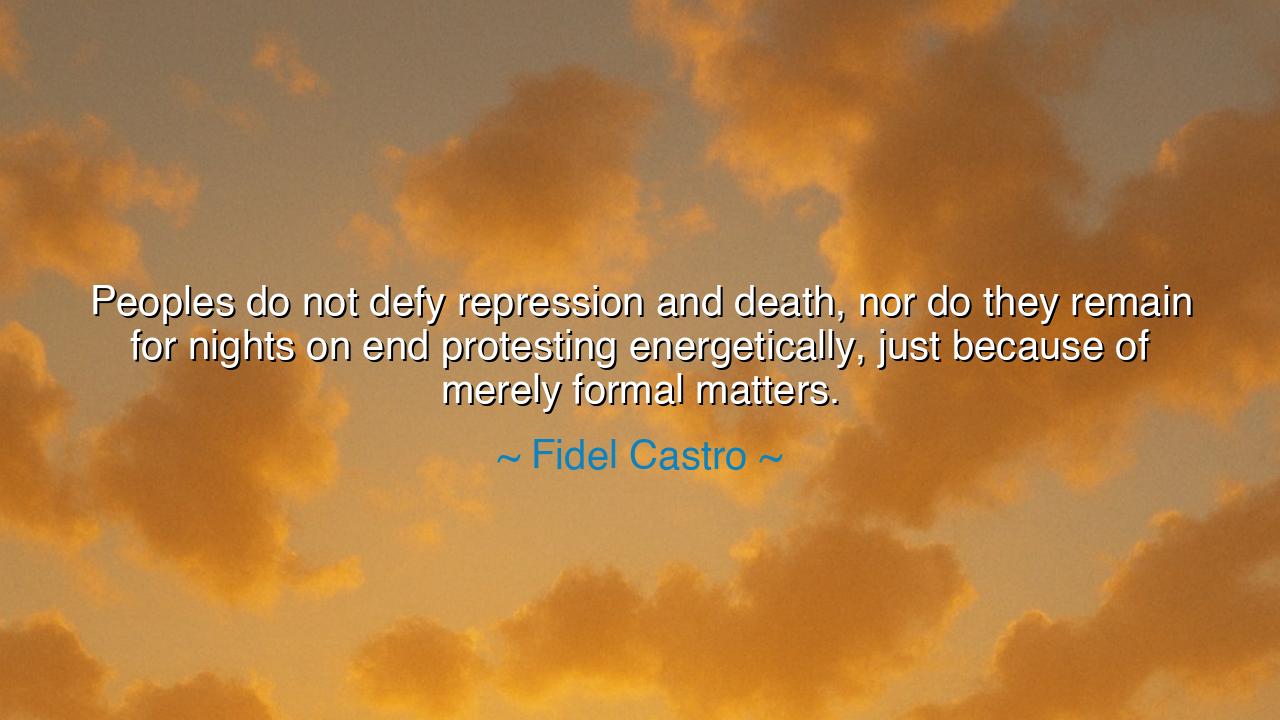
Peoples do not defy repression and death, nor do they remain for
Peoples do not defy repression and death, nor do they remain for nights on end protesting energetically, just because of merely formal matters.





“Peoples do not defy repression and death, nor do they remain for nights on end protesting energetically, just because of merely formal matters.” Thus spoke Fidel Castro, the revolutionary leader of Cuba — a man who, whether loved or condemned, spoke with the fire of conviction. These words, born from the crucible of struggle, speak to the heart of what moves entire nations to rise. In them lies a truth as ancient as history itself: that no people willingly risk their lives for trifles. When men and women face the bayonet, the prison, and the bullet, they do so not for symbols or slogans, but for something deeper — for justice, for dignity, for the soul of their nation.
The origin of this quote rests in the early years of the Cuban Revolution, when Castro stood before the world to justify the courage of his people against the might of a regime that sought to silence them. He was not merely defending an uprising; he was explaining the spiritual logic of resistance. Every revolution, he said, begins not in ambition but in necessity — for no man chooses danger when peace is possible. Thus, when the people fill the streets, when they stand unarmed before soldiers, it is not for “formal matters” — not for the wording of a law, nor for a political pretense — but because their hearts have been pierced by injustice too long endured.
To “defy repression and death” is no small thing. Throughout the ages, humanity has risen against oppression only when its suffering has crossed the boundary of endurance. The French Revolution did not ignite over mere taxes; it was the cry of a starving people who had seen their humanity denied. The Indian struggle for independence, led by Gandhi, was not for a parchment or a decree, but for the right to breathe freely under one’s own sky. Likewise, in Cuba, men fought not merely against the machinery of dictatorship but for the restoration of dignity — for the right to stand upright in a world that had bent them low.
In these words, Castro echoes the timeless law of moral awakening: great movements are born not of intellect, but of suffering. When a people have been humiliated, when their voices are dismissed, when their children hunger and their dreams are mocked, the fire of resistance begins to burn. And once it burns, no force can fully extinguish it. “Nights on end,” they protest — not because it is pleasant, but because truth, once awakened, demands expression. A man can be silenced; a people cannot.
Consider the story of the Solidarity movement in Poland. For years, workers toiled under a regime that promised equality but delivered chains. Their protest began with a strike in the Gdańsk shipyards — small, fragile, easily crushed. Yet the movement spread like wildfire, because the grievances were not formal or abstract; they were written in hunger, in fear, in the bruises of laborers denied dignity. Those men and women risked imprisonment and death, yet they persisted — and through their courage, a nation reclaimed its freedom. Castro’s words find their echo here: no one fights to die; they fight so that life itself may have meaning.
What Castro teaches is not limited to politics, but reaches into the human spirit. Each of us, in our own way, must confront repression — whether from unjust systems, from circumstance, or from the silence within that tells us to accept less than we deserve. The lesson is that true defiance is born of deep necessity. You cannot summon courage for an illusion; you can only find it in the defense of something sacred. The moment you feel your humanity diminished — when your soul cries out that this cannot be the way of life — that is the moment you rise.
The lesson, therefore, is both fierce and noble: do not mistake peace for submission, nor calm for contentment. When people rise, do not dismiss their cries as disorder — listen, for they are the heartbeat of transformation. In your own life, do not wait for the world to grant you justice; kindle it within yourself and in your community. Defy apathy, defy despair, defy the slow death of the spirit that comes from indifference. For the struggle for peace, for dignity, for truth, is the struggle of every generation.
So remember the wisdom of Fidel Castro: when people risk their lives, it is not for appearances, but for essence. They do not fight for formalities, but for the soul’s right to breathe. When you see the fires of protest burning, know that beneath them lies a truth as old as humanity — that no power on earth can suppress a people who have remembered their worth. For when the human spirit rises against injustice, it ceases to fear even death, and that is the moment when history begins to turn.






AAdministratorAdministrator
Welcome, honored guests. Please leave a comment, we will respond soon